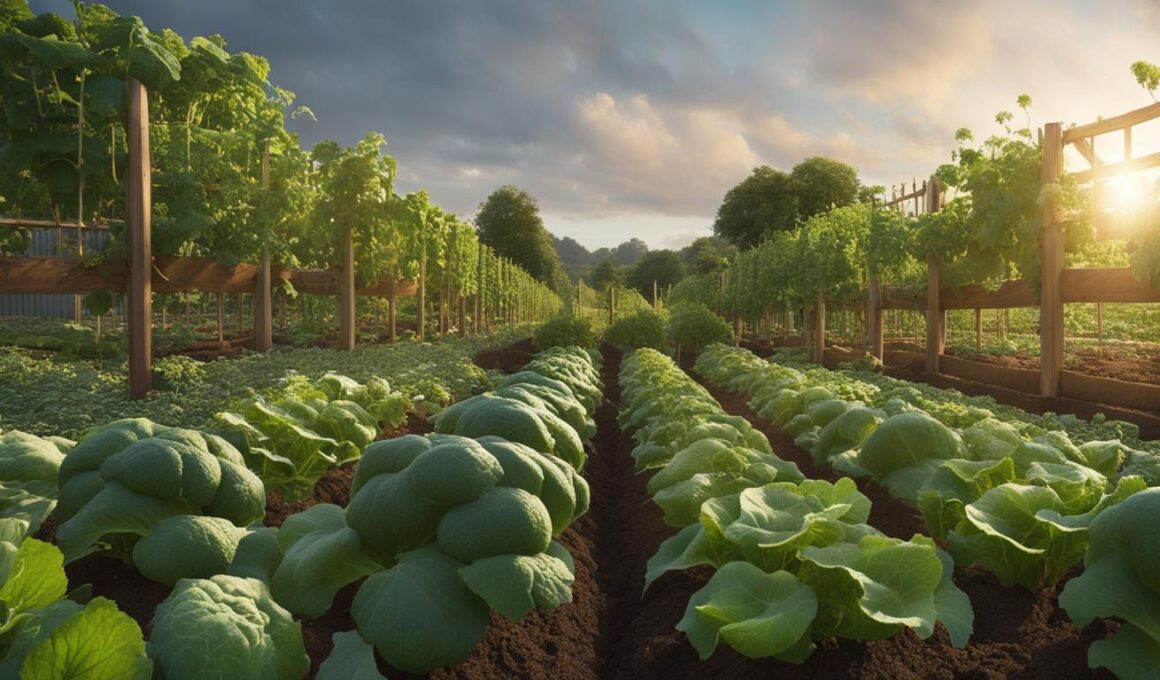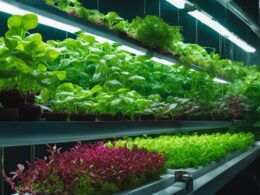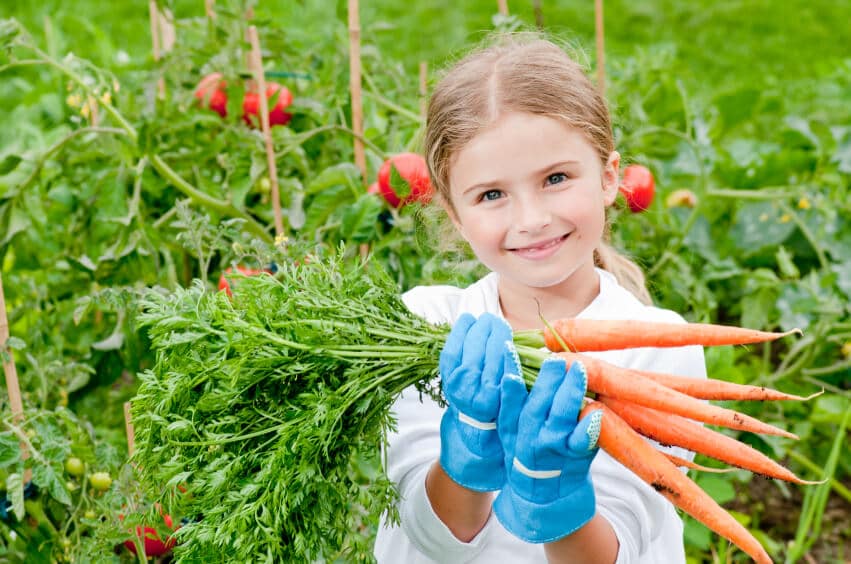Companion planting is a beneficial gardening technique that can enhance the growth and vitality of both cucumber and broccoli plants. When grown together, these plants can provide built-in pest protection, attract pollinators for improved yields, enrich the soil, and optimize space utilization in your garden.
Post Summary:- Growing cucumber and broccoli together through companion planting offers benefits such as pest protection and improved yield.
- Companion planting attracts pollinators and enriches the soil, enhancing the overall health of your garden.
- By growing cucumber and broccoli together, you can make the most of limited space in your garden.
- Choose suitable companion plants that provide multiple benefits, including attracting pollinators and enriching the soil.
- Proper pruning techniques can increase the yield of your broccoli plants.
Benefits of Companion Planting for Broccoli
Companion planting offers several advantages for broccoli. It provides pest protection by planting aromatic plants that repel pests or attract pests away from broccoli. For example, planting marigolds near broccoli can deter aphids and other common pests. Additionally, planting herbs like basil or thyme can help repel harmful insects while attracting beneficial ones like ladybugs or bees. These companion plants act as natural pest control, reducing the need for chemical pesticides and promoting a healthier garden ecosystem.
Companion plants, such as flowers, can also attract pollinators that enhance the health of the ecosystem and benefit the overall garden. Bees, butterflies, and other pollinators are essential for broccoli’s reproductive process, resulting in more abundant and high-quality yields. Including flowers like zinnias or sunflowers near broccoli can create a visually pleasing garden while providing a habitat for pollinators.
Some plants, like legumes, enrich the soil by fixing nitrogen. Nitrogen-fixing plants, such as peas or beans, form a symbiotic relationship with soil bacteria, converting atmospheric nitrogen into a usable form for plants. By interplanting legumes with broccoli, the nitrogen fixation process enriches the soil, making nutrients more bioavailable to broccoli and promoting its growth.
Additionally, companion planting allows for better space utilization, especially in smaller gardens. By carefully selecting companion plants that have compatible growth habits and sizes, you can maximize the use of limited garden space. For example, planting low-growing crops like lettuce or radishes around broccoli can fill in the gaps and prevent weed growth, optimizing space while providing additional harvestable crops.
Benefits of Companion Planting for Broccoli:
- Provides natural pest protection
- Attracts pollinators for improved yields
- Enriches the soil with nitrogen-fixing plants
- Optimizes space utilization in smaller gardens
Companion planting offers a holistic approach to gardening, harnessing the power of nature to create a balanced and thriving ecosystem. By incorporating these companion planting techniques, you can enhance the growth of your broccoli plants while reaping the benefits of pest control, pollination, soil enrichment, and efficient space utilization.
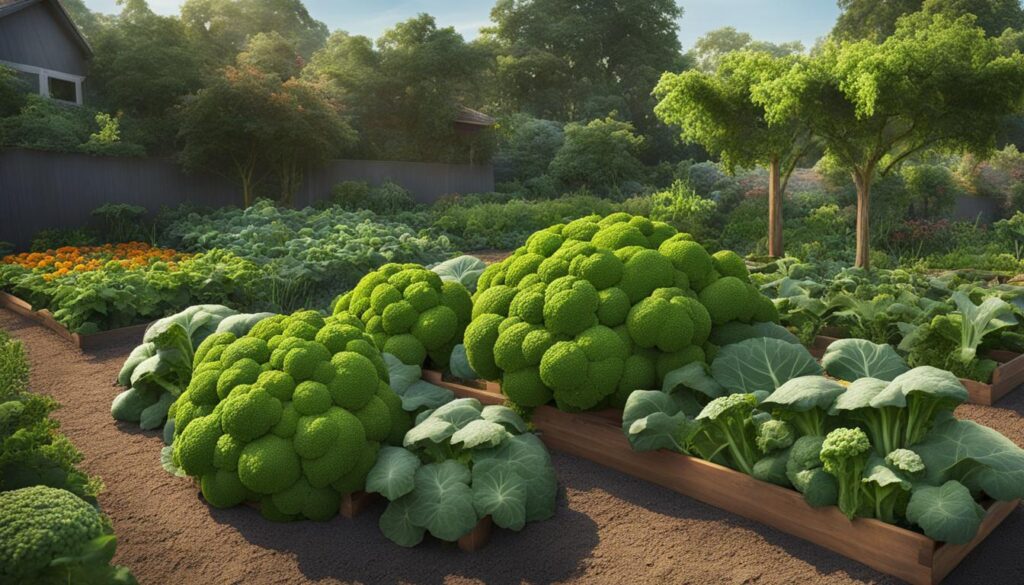
Best Companion Plants for Broccoli
When it comes to companion planting with broccoli, there are several plants that thrive when grown together. Good companion plants for broccoli include beets, chamomile, dill, potatoes, nasturtiums, radishes, spinach, celery, shallots, and rosemary. These plants provide various benefits such as attracting pollinators, enriching the soil, and optimizing space utilization.
Attracting Pollinators
One of the key advantages of companion planting with broccoli is attracting pollinators to your garden. Flowers like chamomile, nasturtiums, and rosemary produce beautiful blooms that attract bees, butterflies, and other beneficial insects. These pollinators play a crucial role in fertilizing the broccoli flowers, resulting in better yields and healthier plants.
Soil Enrichment
Many of the companion plants for broccoli, such as dill, potatoes, spinach, and celery, contribute to soil enrichment. These plants have deep root systems that help break up compacted soil and improve its structure. Additionally, certain plants like legumes, including beans and peas, fix nitrogen in the soil, making it readily available for uptake by the broccoli plants. This natural fertilization process ensures that the broccoli plants receive the necessary nutrients for healthy growth.
Optimizing Space Utilization
Companion planting allows for better space utilization in your garden, especially if you have a limited area. By interplanting broccoli with beets, radishes, or shallots, you can make the most of the available space. These smaller companion plants can be harvested before the broccoli reaches its full size, maximizing the use of your garden beds or containers.
| Companion Plant | Benefits |
|---|---|
| Beets | Enriches the soil, optimizes space utilization |
| Chamomile | Attracts pollinators |
| Dill | Enriches the soil |
| Potatoes | Enriches the soil |
| Nasturtiums | Attracts pollinators |
| Radishes | Optimizes space utilization |
| Spinach | Enriches the soil |
| Celery | Enriches the soil |
| Shallots | Optimizes space utilization |
| Rosemary | Attracts pollinators |
Bad Companion Plants for Broccoli
While companion planting can offer many benefits to broccoli plants, it’s important to be aware of certain plants that should not be grown alongside broccoli. These bad companion plants can have negative effects on the growth and health of your broccoli crop. Avoiding these companion planting mistakes will help you ensure the success of your broccoli garden.
One of the plants to avoid planting with broccoli is other brassicas, including kale, cabbage, brussels sprouts, and cauliflower. These plants belong to the same family as broccoli and can compete for nutrients and space, leading to stunted growth and reduced yields. Additionally, planting strawberries near broccoli is not recommended as they can attract pests that may damage both crops.
Another plant to avoid growing with broccoli is corn. Corn has tall and dense foliage, which can create shading and limit sunlight availability for the broccoli plants. This can hinder the growth and development of the broccoli heads. Similarly, tomatoes should not be planted near broccoli as they can also create a shaded environment and compete for resources, resulting in poor growth.
To summarize, when companion planting with broccoli, it’s best to avoid other brassicas, strawberries, corn, and tomatoes. These plants can either compete for nutrients, attract pests, or create unfavorable growing conditions for broccoli. By being mindful of these bad companion plants, you can optimize the growth and productivity of your broccoli crop.
| Bad Companion Plants for Broccoli | Reason |
|---|---|
| Other Brassicas (kale, cabbage, brussels sprouts, cauliflower) | Competition for nutrients and space |
| Strawberries | Pest attraction |
| Corn | Shading and limited sunlight |
| Tomatoes | Competition for resources |
Tips to Increase Broccoli Yield
To increase the yield of your broccoli plants, there are several key factors to consider. By implementing these tips, you can optimize the growth and productivity of your broccoli crop.
Choose a High-Yield Broccoli Variety
Start by selecting a high-yield broccoli variety that is known for its productivity. These varieties are specifically bred to produce larger heads and more abundant side shoots, resulting in a higher overall yield. Look for varieties such as ‘Green Magic’ or ‘Premium Crop’ for optimal results.
Provide Ample Light, Fertilizer, and Water
Broccoli thrives in full sun, so ensure that your plants receive at least 6-8 hours of direct sunlight each day. This will promote healthy growth and the development of dense, nutrient-rich heads. Additionally, ensure that your plants receive adequate fertilizer and water to support their growth. Use a balanced fertilizer containing nitrogen, phosphorus, and potassium, and water regularly to keep the soil consistently moist, but not waterlogged.
Plant Good Companion Plants
Companion planting with suitable plants can greatly benefit your broccoli crop. Some good companion plants for broccoli include herbs like dill and chamomile, which can attract beneficial insects and deter pests. Additionally, planting flowers such as marigolds and nasturtiums can help repel common pests and attract pollinators, leading to increased fruit set and overall plant health.
Proper Pruning Techniques
Proper pruning is essential for maximizing broccoli yield. When the main head is harvested, cut the stalk at an angle just above the first set of leaves. This will encourage the development of side shoots, which can produce multiple harvests from a single plant. Regularly remove any yellowing or damaged leaves to maintain optimal plant health.
By following these tips, you can increase the yield of your broccoli plants and enjoy a bountiful harvest. Remember to choose a high-yield variety, provide ample light, fertilizer, and water, plant good companion plants, and utilize proper pruning techniques. With the right care and attention, your broccoli crop will thrive and reward you with a plentiful harvest.
Growing Broccoli in Container Gardens
If you don’t have a large garden or want to grow broccoli in a more controlled environment, container gardening is a fantastic option. Not only does it allow you to grow broccoli in smaller spaces, but it also provides flexibility in terms of placement and care. By following a few key guidelines, you can successfully grow broccoli in containers and enjoy a bountiful harvest.
Choosing the Right Container
The first step in container gardening for broccoli is selecting the right container size. Broccoli has a deep root system, so opt for a container that is at least 12 inches deep. A wider container will allow for better plant development and accommodate the growing space required. Ensure that the container has adequate drainage holes to prevent waterlogging, which can lead to root rot.
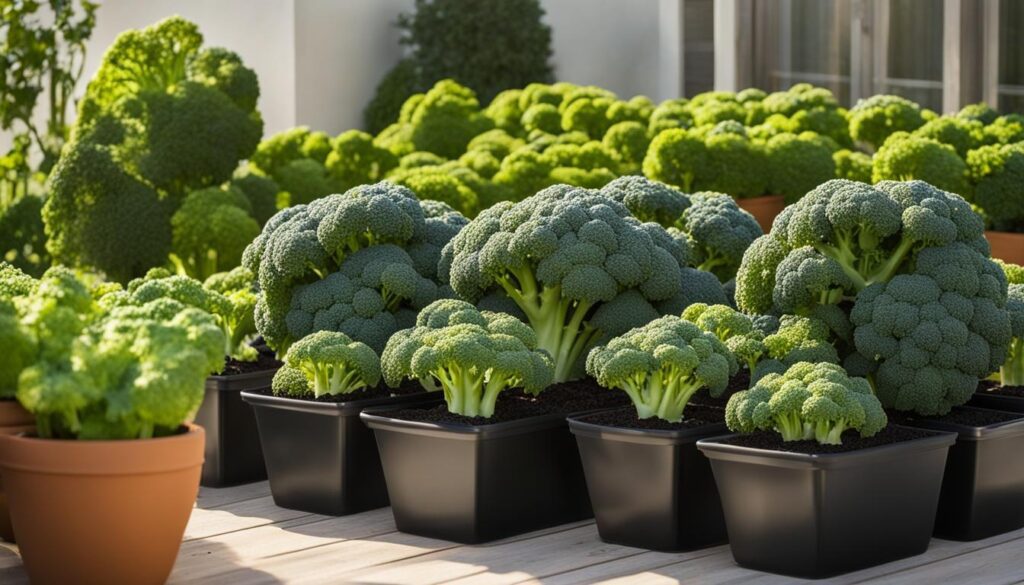
Preparing the Soil
Next, prepare the soil for your container-grown broccoli. Choose a well-draining soil mix that is rich in organic matter. You can either purchase a premixed potting soil or create your own by combining compost, perlite, and garden soil. This will ensure that the soil has the right combination of nutrients and drainage capacity to support the growth of your broccoli plant.
Providing Adequate Sunlight
Broccoli thrives in full sunlight, so place your container in an area that receives at least 6 hours of direct sunlight each day. If you don’t have access to a sunny spot, you can use grow lights to supplement the natural light. Position the lights about 6 inches above the plants and adjust the duration based on the specific light requirements of your broccoli variety.
| Container Size | Recommended Broccoli Plants per Container |
|---|---|
| 12-14 inches | 1 plant |
| 18-24 inches | 2 plants |
| 24-36 inches | 3 plants |
Companion Planting with Broccoli and Cauliflower
If you’re planning to grow broccoli and cauliflower in your garden, you’ll be delighted to know that they make excellent companions. Both plants belong to the same family, Brassicaceae, and have similar nutrient and watering needs, making it easier to care for them together. However, it’s important to be aware of potential pest issues as both crops are susceptible to similar pests.
Companion Plants for Broccoli and Cauliflower
When companion planting with broccoli and cauliflower, consider including trap plants that can divert pests from the main crops. Nasturtiums and marigolds are excellent choices as they attract pests like aphids and caterpillars, effectively protecting your broccoli and cauliflower. Other suitable companion plants for these brassicas include:
- Celery – helps repel pests and improves soil fertility
- Dill – attracts beneficial insects and increases pollination
- Chamomile – repels pests and provides ground cover
- Beets – deter pests and enhance soil nutrients
By incorporating these companion plants into your garden, you can create a beneficial environment that supports the growth and overall health of your broccoli and cauliflower.
“Companion planting is a great way to naturally protect plants and improve overall garden productivity.” – Gardening Expert
Remember to monitor your plants for any signs of infestation and take appropriate action to prevent pests from causing significant damage. With the right companion plants and careful observation, you can enjoy a thriving garden full of healthy broccoli and cauliflower.
| Companion Plants | Benefits |
|---|---|
| Celery | Repels pests and improves soil fertility |
| Dill | Attracts beneficial insects and increases pollination |
| Chamomile | Repels pests and provides ground cover |
| Beets | Deters pests and enhances soil nutrients |
Can Cauliflower Help Cucumber and Broccoli Grow Together?
Cauliflower is a beneficial crop that can enhance the growth of cucumber and broccoli when grown together. The technique of growing cauliflower and spinach together allows for a mutually beneficial relationship, as cauliflower acts as a natural shade provider, protecting cucumber plants from excessive sunlight. Additionally, cauliflower can enhance soil nutrient uptake, benefiting the growth of both cucumber and broccoli plants.
Conclusion
Growing cucumber and broccoli together can be a rewarding experience in your garden. Companion planting with suitable plants can provide numerous benefits for both crops. By following the recommended guidelines and considering compatible companion plants, you can unlock the full potential of growing cucumber and broccoli together.
Companion planting offers a natural form of pest protection, reducing the need for chemical interventions. By selecting plants that repel pests or attract them away from your cucumber and broccoli plants, you can create a healthier ecosystem in your garden.
Furthermore, companion planting can attract beneficial pollinators that enhance the overall health of your crops. By including flowers and other pollinator-attracting plants in your garden, you can increase the chances of successful pollination and achieve better yields.
In addition to pest protection and pollination benefits, companion planting with cucumber and broccoli can also enrich the soil. Some companion plants, like legumes, have the ability to fix nitrogen in the soil, making essential nutrients more available to your crops.
Finally, growing cucumber and broccoli together allows for efficient use of space in your garden. By interplanting these two crops, you can maximize the productivity of your garden beds or containers, even in smaller spaces.
So, give companion planting a try and enjoy the benefits of growing cucumber and broccoli together. With the right companion plants and proper care, you’ll have a bountiful harvest and a thriving garden.
FAQ
Can cucumber and broccoli be grown together?
Yes, cucumber and broccoli can be grown together using companion planting techniques.
What are the benefits of companion planting for broccoli?
Companion planting for broccoli provides pest protection, attracts pollinators, enriches the soil, and optimizes space utilization.
What are the best companion plants for broccoli?
Good companion plants for broccoli include beets, chamomile, dill, potatoes, nasturtiums, radishes, spinach, celery, shallots, and rosemary.
Are there any plants that should not be planted with broccoli?
Yes, bad companion plants for broccoli include other brassicas (such as kale, cabbage, brussels sprouts, and cauliflower), strawberries, corn, and tomatoes.
How can I increase my broccoli yield?
To increase your broccoli yield, choose a high-yield variety, provide ample light, fertilizer, and water, and use suitable companion plants to deter pests and improve soil quality.
Can broccoli be grown in container gardens?
Yes, broccoli can be successfully grown in container gardens. Choose a suitable-sized container with good drainage and fill it with well-draining soil.
Can broccoli and cauliflower be grown together?
Yes, broccoli and cauliflower can be good companions in the garden as they have similar nutrient and watering needs. However, monitor for potential pest infestations as both plants are susceptible to similar pests.
Is it possible to grow cucumber and broccoli together?
Yes, it is possible to grow cucumber and broccoli together using companion planting techniques.





